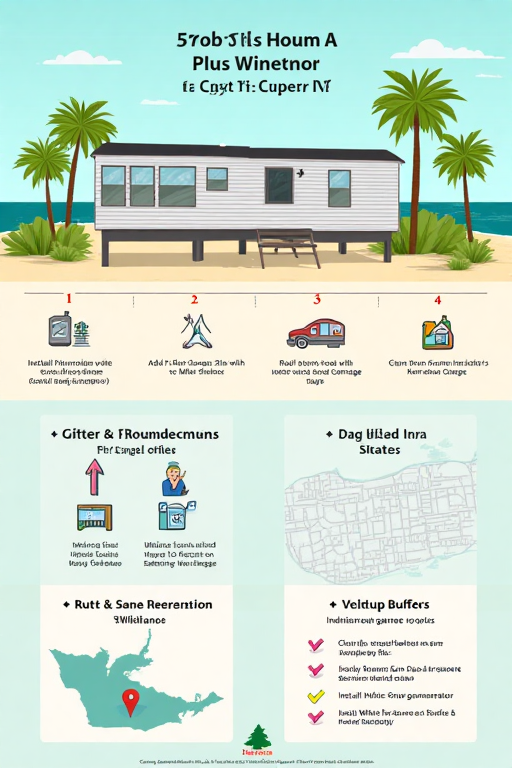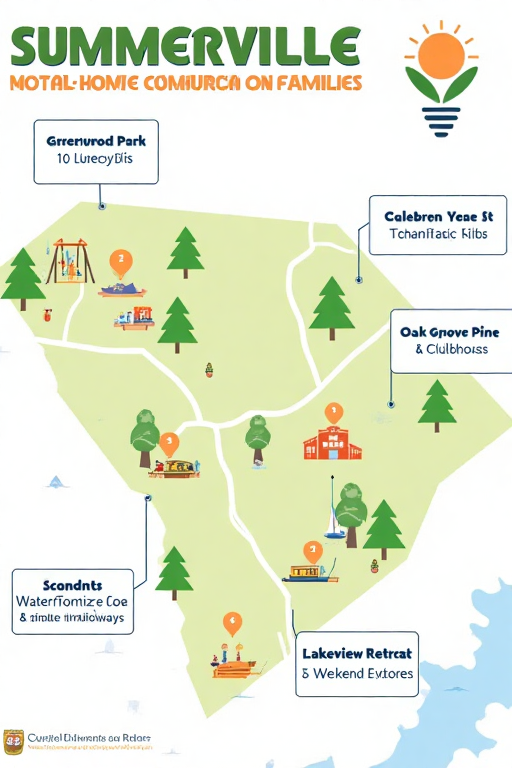Understanding Eviction Rules in South Carolina Mobile Home Parks
Your Comprehensive Guide from Faith Mobile Home Solutions
Introduction
Eviction is one of the most challenging aspects of managing mobile home parks in South Carolina. Whether you are a landlord seeking to enforce lease terms or a tenant facing eviction, understanding the eviction rules is crucial. In South Carolina, mobile home parks are governed by specific laws that balance the rights of property owners and tenants. This comprehensive guide by Faith Mobile Home Solutions is designed to help you navigate the complex eviction process, understand your rights and responsibilities, and explore practical strategies to handle eviction issues effectively.
In this guide, we cover everything from the legal framework and step-by-step eviction procedures to the common grounds for eviction and dispute resolution. We also provide practical tips for both landlords and tenants, discuss financial implications, and address common challenges. Whether you are dealing with late payments, lease violations, or other issues, our goal is to equip you with the information and tools needed to manage eviction in a fair and legally compliant manner.
Read on to discover the essential aspects of eviction rules in South Carolina mobile home parks and learn how to protect your interests while ensuring compliance with state laws.
Legal Framework: The Foundation of Eviction Rules
Understanding the legal framework is the first step in navigating eviction rules in South Carolina mobile home parks. State laws, local ordinances, and lease agreements all play critical roles in shaping the eviction process.
South Carolina Landlord-Tenant Law
South Carolina’s landlord-tenant laws provide guidelines for eviction, outlining the rights and responsibilities of both parties. These laws ensure that evictions are carried out in a fair and orderly manner while protecting the rights of tenants.
Mobile Home Park Regulations
Mobile home parks often have additional rules and regulations that govern tenant behavior, park operations, and eviction procedures. It is important to review your mobile home park’s rules as they may contain specific provisions that supplement state laws.
Lease Agreements
Your lease agreement is a legally binding document that outlines the terms of occupancy, payment requirements, and grounds for eviction. Familiarize yourself with the lease provisions, as they serve as the primary guide for any eviction proceedings.
By understanding the legal framework, both landlords and tenants can better navigate the eviction process while safeguarding their rights.
The Eviction Process: Step-by-Step Guide
The eviction process in South Carolina is methodical and must adhere to strict legal procedures. Here is a step-by-step overview of the typical eviction process for mobile home parks:
Step 1: Notice to Quit
The process begins with a formal "Notice to Quit" or "Notice to Cure," which informs the tenant of a violation (e.g., non-payment of rent or breach of lease terms) and provides a specified period to remedy the issue.
Step 2: Filing an Eviction Action
If the tenant fails to comply with the notice, the landlord can file an eviction action in local court. Proper documentation and evidence of the violation are essential at this stage.
Step 3: Court Hearing
A court hearing is scheduled where both the landlord and tenant can present their cases. The judge reviews the evidence and determines whether eviction is warranted.
Step 4: Writ of Possession
If the court rules in favor of the landlord, a writ of possession is issued, authorizing law enforcement to remove the tenant and the property if necessary.
Step 5: Enforcement
The final step is the physical removal of the tenant by law enforcement if the tenant still refuses to vacate the premises. This step is typically a last resort and must be conducted in accordance with legal procedures.
Each step of the eviction process is designed to ensure fairness and legal compliance. Both landlords and tenants should understand these steps to protect their rights and navigate the process effectively.
Grounds for Eviction in Mobile Home Parks
Evictions in mobile home parks can be initiated for various reasons. Understanding the common grounds for eviction can help both landlords enforce lease terms and tenants avoid violations.
Non-Payment of Rent
Failure to pay rent on time is the most common reason for eviction. Most lease agreements specify a grace period, after which the tenant may be issued a notice to quit.
Lease Violations
Violations of lease terms, such as unauthorized subletting, damaging property, or disruptive behavior, can be grounds for eviction. The lease agreement will outline specific behaviors that may lead to termination of the tenancy.
Failure to Cure a Violation
If a tenant fails to remedy a violation after receiving a notice to cure, the landlord may proceed with eviction. This step is essential to ensure that the tenant has ample opportunity to correct the issue.
Illegal Activity
Engaging in illegal activities on the premises is a serious violation that can result in immediate eviction. Landlords are obligated to maintain a safe environment for all residents.
Clearly understanding these grounds for eviction helps ensure that both parties are aware of the expectations and potential consequences outlined in the lease agreement.
Tenant & Landlord Rights: Balancing Interests
The eviction process is governed by laws that protect both landlords and tenants. Understanding these rights is crucial for ensuring a fair and equitable process.
Landlord Rights
Landlords have the right to enforce lease agreements, collect rent, and take legal action against tenants who violate the terms of their lease. They are also entitled to a timely eviction if the tenant fails to comply with notice requirements.
Tenant Rights
Tenants are protected by state and federal laws that ensure fair treatment during the eviction process. They have the right to receive proper notice, dispute allegations in court, and seek legal counsel if necessary.
Balancing the Interests
Effective communication, thorough documentation, and adherence to legal procedures are key to balancing the rights of both parties. This balance helps prevent conflicts and ensures that the eviction process is carried out fairly.
Common Challenges & Disputes in Eviction Cases
Even when all legal procedures are followed, eviction cases can face challenges and disputes. Understanding these common issues can help both landlords and tenants prepare for potential conflicts.
Disputes Over Lease Violations
Disagreements about what constitutes a breach of lease are common. Clear lease terms and thorough documentation can help resolve these disputes.
Non-Payment Disputes
Tenants may contest claims of non-payment, especially if there are discrepancies in records or issues with property management. Detailed payment histories and communication records are essential in these cases.
Appeals and Legal Delays
The eviction process can sometimes be delayed by appeals or legal challenges. Both parties should be prepared for a potentially lengthy process and seek mediation where possible.
Addressing common challenges proactively can help minimize disputes and lead to a smoother eviction process for everyone involved.
Financial Considerations & Implications
Evictions can have significant financial implications for both landlords and tenants. It is important to understand these factors as part of the overall eviction strategy.
Costs for Landlords
Landlords may incur legal fees, court costs, and lost rental income during the eviction process. Additionally, a prolonged vacancy can decrease the overall profitability of the property.
Costs for Tenants
For tenants, eviction can lead to significant financial hardship, including the loss of a security deposit, moving expenses, and the difficulty of securing new housing.
Long-Term Financial Impact
Both parties should consider the long-term financial implications of an eviction. For landlords, a successful eviction process can help maintain the integrity of the rental property, while for tenants, understanding their rights can prevent undue financial loss.
Careful financial planning and clear communication can help mitigate the negative financial impacts of eviction proceedings.
Expert Tips from Faith Mobile Home Solutions
Our team at Faith Mobile Home Solutions has extensive experience with mobile home park management and eviction processes in South Carolina. Here are our top expert tips to help you navigate eviction challenges effectively:
Document Everything
Maintain detailed records of all tenant communications, payment histories, lease violations, and repair requests. Documentation is crucial for supporting your case in court and resolving disputes quickly.
Follow Legal Procedures
Ensure that you adhere strictly to South Carolina’s eviction laws and your lease agreement. Proper legal notice and adherence to timelines are essential to avoid delays or dismissal of your case.
Communicate Clearly
Open and respectful communication with tenants can sometimes resolve issues without the need for formal eviction. Clear discussions may help avoid misunderstandings and lead to amicable resolutions.
Seek Mediation
If disputes arise, consider mediation as a way to reach a fair resolution without prolonged litigation. Mediation can save time, reduce costs, and preserve a positive relationship.
Consult Legal Professionals
Work with an experienced attorney who specializes in landlord-tenant law to ensure that you understand your rights and obligations. Professional legal advice can prevent costly mistakes and streamline the eviction process.
Prepare for Court
If the eviction process goes to court, be thoroughly prepared with all necessary documentation, evidence, and a clear timeline of events. A well-organized case increases your chances of a favorable outcome.
Implementing these expert tips will help you handle eviction situations professionally, minimize conflicts, and protect your investment in mobile home parks.
Conclusion: Navigating Eviction with Confidence and Fairness
Understanding eviction rules in South Carolina mobile home parks is essential for both landlords and tenants. By familiarizing yourself with the legal framework, following the proper eviction process, and taking proactive steps to document and communicate, you can navigate eviction challenges with confidence and fairness.
Whether you are a landlord seeking to enforce lease terms or a tenant fighting for your rights, the key to success lies in preparation, clear communication, and adherence to legal procedures. With the expert strategies and practical tips outlined in this guide from Faith Mobile Home Solutions, you will be well-equipped to handle eviction issues in a manner that protects your interests and promotes a just resolution.
Thank you for choosing Faith Mobile Home Solutions as your trusted resource for mobile home management and legal guidance. We wish you success in resolving eviction challenges and maintaining a positive, secure mobile home community in South Carolina.
Frequently Asked Questions (FAQs)
1. What are the primary reasons for eviction in mobile home parks?
Common reasons include non-payment of rent, lease violations, illegal activity, and failure to remedy a lease breach.
2. How much notice must a landlord give before eviction?
Notice requirements vary by lease agreement and local laws, but typically a 5- to 30-day notice is required.
3. Can a tenant dispute an eviction notice?
Yes, tenants can dispute an eviction notice in court if they believe it was issued improperly or if there are extenuating circumstances.
4. What legal protections do tenants have in South Carolina?
Tenants are protected by state and federal laws, including the South Carolina Residential Landlord Tenant Act and fair housing laws.
5. What documents should a landlord keep during the eviction process?
Landlords should maintain copies of lease agreements, payment records, notices served, repair requests, and any communication with the tenant.
6. How long does the eviction process typically take?
The timeline varies, but the entire process—from notice to court resolution—can take several weeks to a few months.
7. What happens if a tenant fails to vacate after an eviction ruling?
If a tenant refuses to leave, law enforcement may be called to execute a writ of possession, following a court order.
8. Are eviction rules different for mobile home parks compared to other rental properties?
Yes, mobile home parks may have additional rules outlined in the lease agreement and park regulations that can affect the eviction process.
9. Can a landlord evict a tenant for minor lease violations?
Minor violations may not warrant immediate eviction. Landlords often provide a notice to cure, giving tenants an opportunity to correct the issue.
10. What is a “Notice to Quit”?
A “Notice to Quit” is a formal document served by the landlord that notifies the tenant of the lease violation and the deadline to vacate the property if the issue is not resolved.
11. How can mediation help in eviction disputes?
Mediation offers a less adversarial approach to resolving disputes, allowing both parties to reach a mutually acceptable solution without lengthy court proceedings.
12. What are the financial consequences of eviction for landlords?
Landlords may incur legal fees, lost rent, and additional costs associated with re-renting the property, all of which can impact overall profitability.
13. Do tenants have the right to remain if they are in arrears on rent?
Tenants in arrears must typically pay the overdue amount within the notice period to avoid eviction, though legal protections may vary.
14. Can eviction proceedings be delayed due to legal disputes?
Yes, disputes over lease violations, improper notice, or other legal challenges can delay the eviction process.
15. How important is clear communication in the eviction process?
Clear, documented communication can prevent misunderstandings and provide crucial evidence in legal proceedings.
16. What steps should landlords take to avoid wrongful eviction claims?
Landlords should adhere strictly to legal procedures, document all communications, and ensure they have valid grounds for eviction.
17. How can tenants protect their rights during eviction?
Tenants should familiarize themselves with local landlord-tenant laws, maintain records of all communications, and seek legal counsel if necessary.
18. What impact do eviction proceedings have on a tenant’s credit?
An eviction can negatively affect a tenant’s credit score, making it more difficult to secure housing or loans in the future.
19. Are there alternatives to eviction?
Alternatives include negotiating a payment plan, mediation, or lease termination agreements that can benefit both parties.
20. Can a mobile home park evict a tenant without going to court?
While informal resolutions may occur, formal eviction typically requires a court process to ensure legal compliance and protect the rights of both parties.
21. What are the key legal documents needed for an eviction?
Essential documents include the lease agreement, eviction notices, payment records, and any correspondence related to lease violations.
22. How do late fees factor into the eviction process?
Late fees are often outlined in the lease agreement and may serve as additional grounds for eviction if consistently enforced.
23. Can an eviction affect my property taxes or insurance?
Indirectly, an eviction and subsequent property turnover can affect property management costs and insurance premiums.
24. What role does mediation play in resolving eviction disputes?
Mediation can help both parties reach a mutually acceptable solution, potentially avoiding a lengthy and costly court battle.
25. Where can I find more detailed information about South Carolina eviction laws?
For additional resources, consult local government websites, legal aid organizations, and Faith Mobile Home Solutions for expert guidance.
Additional Keywords
- eviction rules
- mobile home eviction
- South Carolina eviction
- landlord tenant law
- Faith Mobile Home Solutions
- eviction process
- lease violation eviction
- tenant rights SC
- landlord rights SC
- eviction notice
- legal eviction process
- eviction timeline
- eviction mediation
- eviction appeal
- court eviction
- eviction documentation
- rental dispute resolution
- mobile home park eviction
- SC landlord regulations
- SC tenant protections
- eviction legal advice
- eviction safety
- property management eviction
- eviction FAQs
- eviction resources




